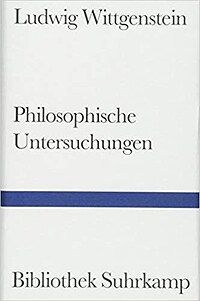Status
Call number
Collection
Publication
Description
Incorporating significant editorial changes from earlier editions,the fourth edition of Ludwig Wittgenstein's PhilosophicalInvestigations is the definitive en face German-Englishversion of the most important work of 20th-century philosophy The extensively revised English translation incorporates manyhundreds of changes to Anscombe?s original translation Footnoted remarks in the earlier editions have now beenrelocated in the text What was previously referred to as ?Part 2? is nowrepublished as Philosophy of Psychology ? A Fragment,and all the remarks in it are numbered for ease of reference New detailed editorial endnotes explain decisions oftranslators and identify references and allusions in Wittgenstein'soriginal text Now features new essays on the history of the PhilosophicalInvestigations, and the problems of translatingWittgenstein?s text… (more)
Media reviews
User reviews
It is a book that can be read in three ways. Sometimes I will read it from cover to cover. Other times one can read just a group of sections on a specific topic, say the rules for use being the meaning of a word. Lastly I can light my pipe, sit by the fire and read a few sections at random - it always generates new ideas. In this it has an unexpected affinity with a volume of poems.
Wittgenstein is not everybody's cup of tea, but he is mine, and if one is open-minded, this work, along with the Tractatus and the Remarks on Mathematics, has something to offer to all.
By the way, although LibraryThing classifies this work as German philodophy, Wittgenstein, like several Logical Positivists, was an Austrian.
What is the process of trying to understand what it means to know something? Is there any conflict within a language game? There may be infinite variations in our everyday experiences; if so, how can we reach a resolution or should we seek that as a useful goal?
We should consider the use of comparison and noticing similarities. Sometimes that may bring insight. However the text often provides an invitation to enter into a dialog about the meaning of life and how one might understand the proper end of one's life. (language and dialog)
I am reminded of “the search” --- “What is the nature of the search . . . The search is what anyone would undertake if he were not sunk in the everydayness of his own life.” - Walker Percy
That is we are not looking for philosophical statements but the reality of what is here in everyday language. One wonders if this is a method for escaping the “everydayness” of life and the seeming incongruity of such a process? (117) One key for escaping the everydayness of life is recognizing the situation of a “fish out of water” and thinking in a way that you may become just that.
Our imagination may be a tool that allows recognition of just such a situation. (129) I personally am intrigued by the effect on my imagination of listening to music – different effects result from different types of music (Liszt or Ligeti). Whatever the means you may choose it is important to realize that language can do many things if we only look at the way we use words. We should aim to see clearly if possible. (Observation)
